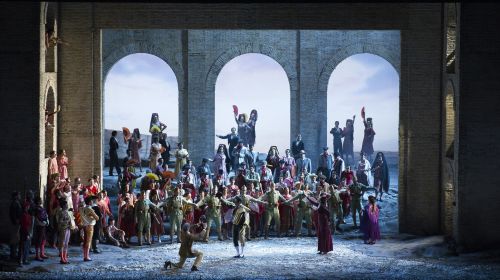 Argentina Bizet, Carmen: Soloists,Chorus and Orchestra of Teatro Colón. Conductor:Marc Piollet, Teatro Colón, Buenos Aires. 16.4.2013. (JSJ)
Argentina Bizet, Carmen: Soloists,Chorus and Orchestra of Teatro Colón. Conductor:Marc Piollet, Teatro Colón, Buenos Aires. 16.4.2013. (JSJ)
Cast:
Carmen: Jossie Pérez / Oksana Volkova
Don José: Thiago Arancam / Enrique Folger
Escamillo: Rodrigo Esteves / Fernando Radó
Micaela: Inva Mula / Virginia Wagner
Zúñiga: Fernando Radó / Mario De Salvo
Remendado: Sergio Spina
Morales: Norberto Marcos / Fernando Grassi
Frasquita: Marina Silva / Victoria Gaeta
Mercedes: Florencia Machado / Vanesa Tomás
Dancairo: Alejandro Meerapfel / Gustavo Gibert
Lillas Pastia: Sebastiano De Filippi
Production:
Director: Emilio Sagi
Sets: Daniel Bianco
Costumes: Renata Schussheim
Lighting: Eduardo Bravo
Chorus: Miguel Martínez
Children’s Chorus: César Bustamante
Choreography: Nuria Castejón

The ever popular Carmen was the work of choice to open the Teatro Colón’s 2013 season. The production is the (then new) 2012 production from Santiago’s Teatro Municipal (although with a different cast), and the version the original one with dialogue.
Spanish producer Emilio Sagi’s perspective on the work is based on Carmen’s words in the final duet “I was born free and will die free,” with Carmen a strong willed and free spirited woman and Micaela the counterpoint.
The work is set in the 1820s but Sagi has it 100 years or more later, with Daniel Bianco’s sets using the full extent of the stage to present a broad panorama with a sense of perspective for the Seville plaza and the gipsy encampment or split to give a sense of indoor/outdoor for the gaol and Lillas Pasta’s tavern. Appropriate lighting – bright for a sunny Seville, more subdued for the gipsy encampment – matched this perfectly while the dress was also in style – even Carmen’s appearance in trousers out in the mountains in Act 3 not out of place, although her lighting of a cigarette after seeing off Don Jose was unnecessary.
Carmen was played by the Puerto Rican mezzo Jossie Pérez, voluptuous both vocally and physically. No mistaking her will and the rawness of the changing emotions as they are played out. Alongside her Brazilian Thiago Arancam as Don José was overshadowed, and with his particular “dry” timbre, at times sounded strained.
Albanian soprano Inva Mula was also outstanding as Micaela, effectively conveying an innocence in manner and her sweetness of voice. However, another Brazilian Rodrigo Esteves, although looking the part of Escamillo, also failed to impress vocally, lacking the strength and authority to be expected of him.
Good performances also from Marina Silva (Frasquita), Florencia Machado (Mercedes) and Fernando Radó (Zúñiga), and from both the chorus and children’s chorus.
Marc Piollet set a breathtaking pace for the overture and the orchestra maintained that tautness and discipline throughout.
Jonathan Spencer Jones